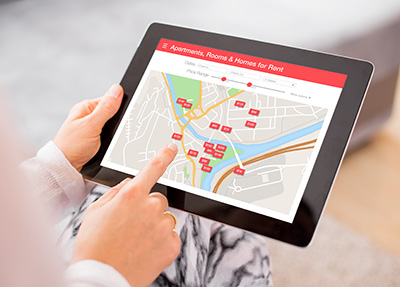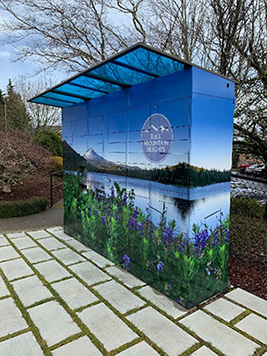Zeitgeist - Sign of the Times
The AirBnB Effect
Since the beginning of the rapid growth in short-term rental housing (“STRs”) in the mid-1990’s, AirBnB has emerged as the largest player in the market with over 7,000,000 listings in 220 countries. In comparison, the top ten hotel chains have about 5,500,000 rooms.
 AirBnB markets itself as an easy way for homeowners to earn additional income by hosting short term guests. However, of the over 1,000,000 AirBnB listings in the U.S., more than 60% are owned by professional hosts which operate at least two other STR units. And as of 2018, nightly stays in apartment buildings represented 65% of the total rentals with 35% in single-family homes. The data suggests that the original concept behind AirBnB – for homeowners to supplement their income via short-term rentals of their primary homes – has morphed into something else.
AirBnB markets itself as an easy way for homeowners to earn additional income by hosting short term guests. However, of the over 1,000,000 AirBnB listings in the U.S., more than 60% are owned by professional hosts which operate at least two other STR units. And as of 2018, nightly stays in apartment buildings represented 65% of the total rentals with 35% in single-family homes. The data suggests that the original concept behind AirBnB – for homeowners to supplement their income via short-term rentals of their primary homes – has morphed into something else.
STRs can have both positive and negative impacts on their communities. While they create additional income for “hosts” and bolster local businesses, they have a negative impact on nearby hotels, can lead to a shortage of neighborhood parking and reduce the availability of traditional rental housing. By converting a single-family home or apartment to an STR unit, investors are essentially removing much needed long-term housing for local residents while contributing to the increase in rents and home prices. And as STRs become more popular – they’ve increased 105% in the U.S. since 2017 – their impact is compounding the nation’s already historic housing shortage.
The negative impacts have not gone unnoticed by policymakers, who are facing increasing pressure to boost the supply of affordable rental housing, especially in larger cities. In response to supply concerns, New York City has banned STRs in apartment buildings and implemented fines of up to $7,500 for rentals of less than 30 days. Denver limits STR’s to owners’ primary residences; violators can be fined up to $1,000 per day. Many other municipalities are following suit and adopting STR restrictions of their own. The future of the short-term rental industry, a growing powerhouse in overnight travel, is as uncertain as ever.
Package Delivery Overload!
U.S. retail sales were up 16% year-over-year in October 2021 according to recent Reuters report. This massive buying surge coupled with the explosive growth in e-commerce means more packages are being delivered to front doors and mailrooms. The drastic increase in packages over a short period of time – parcel delivery surged 70% during the Pandemic – has left apartment owners without efficient package delivery systems with a major strain on front office personnel and storage capabilities.
 Package Concierge, a leading provider of automated locker and package room solutions, estimates that package handling time for apartment communities can cost owners up to $25,000 per year. Those who work in apartment offices can attest to the mayhem associated with package deliveries – especially in dense, urban communities. They struggle with a panoply of issues, including package storage, resident communication surrounding pick-ups and theft.
Package Concierge, a leading provider of automated locker and package room solutions, estimates that package handling time for apartment communities can cost owners up to $25,000 per year. Those who work in apartment offices can attest to the mayhem associated with package deliveries – especially in dense, urban communities. They struggle with a panoply of issues, including package storage, resident communication surrounding pick-ups and theft.
Automated package lockers (also known as “smart lockers”) are a godsend for frustrated residents and overworked front office staff. Today’s smart lockers feature package security, instant delivery notifications and 24/7 contact-free pick-up and are quickly become ubiquitous in apartment communities.
Over the past several years, the industry has rapidly evolved and lockers now come equipped for indoor and outdoor use along with refrigerated compartments for medicine and perishable items. Property managers can utilize the lockers to provide new residents with keys to their apartments and to distribute important documents. As the e-commerce industry continues to boom and packages continue to flow, we expect the automated package industry to see lockstep growth.
(Editor’s Note: Pathfinder has been investing in package delivery systems for several years. Check out the customized locker at our Bull Mountain Heights property in Vancouver, Washington.)
Share this Article
IN THIS ISSUE
PATHFINDER PARTNERS INCOME FUND, L.P.
A Stablized Multifamily Fund
CHARTING THE COURSE
Fed Acknowledges Inflation Isn’t “Transitory” After All
(Even a Blind Squirrel Can Find an Acorn Once in a While)FINDING YOUR PATH
Reflections on an Interesting Year
GUEST FEATURE
A Housing Crisis Q&A
ZEITGEIST
Sign of the Times
TRAILBLAZING
The Maddox, Mesa (Phoenix), AZ
NOTABLES AND QUOTABLES
A Fresh Start
